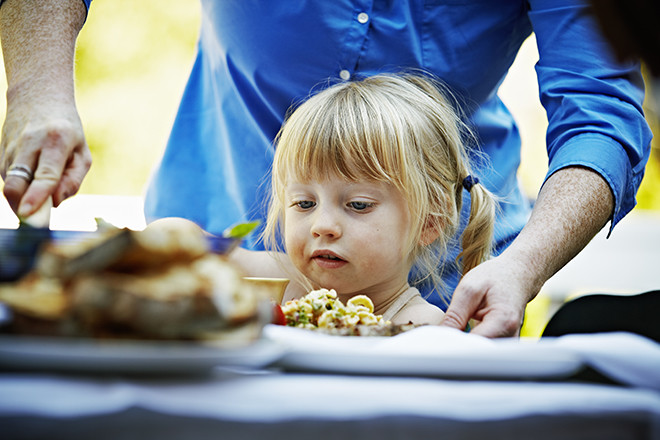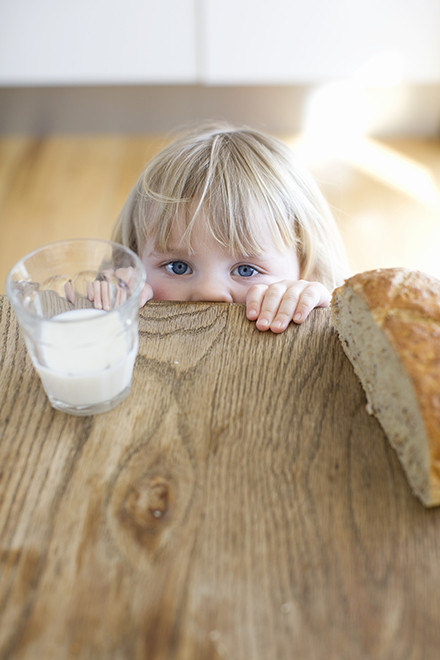If you look closely at the word"Upbringing," then it's easy to notice: it happens from the word "feed", that is, "feed". It is not surprising that the issues of food are the most discussed in the courses on parental skill, on the bench near the children's playground, at forums, in the office of the district pediatrician. What to feed, in what quantities, how often - these questions only on the tip of the iceberg. Proper nutrition of the new person for the preservation and strengthening of his health, of course, should be given great importance. A photo: Getty Images Parents are often confident that they "know better." And the grandmothers are always convinced of this. But in fact, adults often make mistakes, forming the child's eating habits. As - says Larisa Surkova, a practicing psychologist and mother of five children.
A photo: Getty Images Parents are often confident that they "know better." And the grandmothers are always convinced of this. But in fact, adults often make mistakes, forming the child's eating habits. As - says Larisa Surkova, a practicing psychologist and mother of five children. - Unfortunately, mistakes in the nutrition of childrenthere are a lot of catastrophes, and they can be said to be inherited. Often the grandmother feeds her grandchildren with food, worrying that her child is losing weight at a party, and her parents will not approve. Tolstenky ruddy toddler is the main indicator of a good, responsible grandmother. Meanwhile, a strict mother says: "Until you eat, you will not leave the table," which also has a negative impact on the children's psyche. Without knowing it, adults prevent a child from establishing contact with his own body, learn to listen to himself and his needs. Another common mistake of adults is premature translation to a common table. In children under three years of weak immunity, inadequate activity of enzymes, and therefore, the reaction to "adult" food can be difficult.
- Unfortunately, mistakes in the nutrition of childrenthere are a lot of catastrophes, and they can be said to be inherited. Often the grandmother feeds her grandchildren with food, worrying that her child is losing weight at a party, and her parents will not approve. Tolstenky ruddy toddler is the main indicator of a good, responsible grandmother. Meanwhile, a strict mother says: "Until you eat, you will not leave the table," which also has a negative impact on the children's psyche. Without knowing it, adults prevent a child from establishing contact with his own body, learn to listen to himself and his needs. Another common mistake of adults is premature translation to a common table. In children under three years of weak immunity, inadequate activity of enzymes, and therefore, the reaction to "adult" food can be difficult. A photo: Getty Images So, with this we figured out - there is a children's table and a general. When a child needs to be transferred from the first to the second, explained Zainudin Zainudinov, MD, chief physician at the NII Nutrition Clinic.
A photo: Getty Images So, with this we figured out - there is a children's table and a general. When a child needs to be transferred from the first to the second, explained Zainudin Zainudinov, MD, chief physician at the NII Nutrition Clinic. - Nature of child nutrition from one year to 3 yearsgradually more and more approaching what is usually eaten at home at a family table. The baby is more and more interested in adult food, he tries to imitate family members and certainly wants to try what the daddy, mom, brother or sister eat. It is during this period that food habits are formed. The child has enough teeth to feel good. And its diet is gradually expanding: liquid and semi-liquid food is supplemented by a thicker and denser food. The menu includes soups, boiled porridge and stewed vegetables, scrambled eggs, vegetable and cereal casseroles, small pieces of meat, meatballs and steam cutlets. By the way, the food prepared on the eve of the day should not be given. The child should always have food not only fresh, nutritious and varied, but also appetizing - the food should look so that she would like to try.
- Nature of child nutrition from one year to 3 yearsgradually more and more approaching what is usually eaten at home at a family table. The baby is more and more interested in adult food, he tries to imitate family members and certainly wants to try what the daddy, mom, brother or sister eat. It is during this period that food habits are formed. The child has enough teeth to feel good. And its diet is gradually expanding: liquid and semi-liquid food is supplemented by a thicker and denser food. The menu includes soups, boiled porridge and stewed vegetables, scrambled eggs, vegetable and cereal casseroles, small pieces of meat, meatballs and steam cutlets. By the way, the food prepared on the eve of the day should not be given. The child should always have food not only fresh, nutritious and varied, but also appetizing - the food should look so that she would like to try. A photo: GettyImages Many people have good reason to consider milk as the most useful product for a child. Is it so? And why should he drink this baby? WDay was answered by Kaleria Ladodo, pediatrician and nutritionist, doctor of medical sciences, professor, corresponding member of the Russian Academy of Natural Sciences.
A photo: GettyImages Many people have good reason to consider milk as the most useful product for a child. Is it so? And why should he drink this baby? WDay was answered by Kaleria Ladodo, pediatrician and nutritionist, doctor of medical sciences, professor, corresponding member of the Russian Academy of Natural Sciences. - First of all, milk is protein. Protein is an indispensable material for building new cells, including blood, hormones and antibodies that can fight harmful viruses and bacteria. Proteins come from food decay to amino acids, then the body builds their own protein compounds from them. If the norm of protein intake for an adult is grams per kilogram of weight per day, then for an one-year-old child - 3 grams per kilogram of weight. At 3 years on average 42 grams of protein are needed daily, in 4 - 54 grams. Inadequate protein intake in children develops growth retardation, decreased immunity and so on.In addition to protein in milk contains more than 100 useful components: vitamins, minerals and 8 essential amino acids that are not produced in the human body and must be supplied in sufficient quantities from outside: tryptophan , phenylanine, lysine, threonine, methionine, leucine, isoleucine, valine. And of course, the child needs calcium for the development of teeth and bones. Of course, milk should be selected, passed special certification for baby food.
- First of all, milk is protein. Protein is an indispensable material for building new cells, including blood, hormones and antibodies that can fight harmful viruses and bacteria. Proteins come from food decay to amino acids, then the body builds their own protein compounds from them. If the norm of protein intake for an adult is grams per kilogram of weight per day, then for an one-year-old child - 3 grams per kilogram of weight. At 3 years on average 42 grams of protein are needed daily, in 4 - 54 grams. Inadequate protein intake in children develops growth retardation, decreased immunity and so on.In addition to protein in milk contains more than 100 useful components: vitamins, minerals and 8 essential amino acids that are not produced in the human body and must be supplied in sufficient quantities from outside: tryptophan , phenylanine, lysine, threonine, methionine, leucine, isoleucine, valine. And of course, the child needs calcium for the development of teeth and bones. Of course, milk should be selected, passed special certification for baby food. Photo: Getty Images But we got to sleep. By the way, he is no less important than food. If a person can do without food for two or three weeks, then without sleep - not more than five days. And the child? How much time does he have for sleep? Larisa Surkova:
Photo: Getty Images But we got to sleep. By the way, he is no less important than food. If a person can do without food for two or three weeks, then without sleep - not more than five days. And the child? How much time does he have for sleep? Larisa Surkova: - For young children, the recommendedthe duration of sleep is 12-14 hours, however, according to statistics, ¾ of children sleep less than the minimum prescribed for 1,5-2 hours. It would seem that little, however, Finnish scientists found out: even a small but regular lack of sleep is enough for the emergence of hyperactivity, impulsivity, attention deficit disorder. There is an opinion: geniuses slept little and often worked at night. This schedule, for example, was followed by Balzac: he slept from 6 pm to 1 am, and then worked until morning. But for a child, such a lack of sleep is very harmful. The correct sleep should begin at 20-21 hours: at this time, the melatonin sleep hormone begins to develop actively, the muscles relax, the glucose concentration in the blood drops, the processes in the body slow down, the temperature decreases and the state of drowsiness sets in. If this moment is caught, turn off the light and go to bed, then the dream will be deep and calm, without nightly awakenings and feelings of fatigue during the day.
- For young children, the recommendedthe duration of sleep is 12-14 hours, however, according to statistics, ¾ of children sleep less than the minimum prescribed for 1,5-2 hours. It would seem that little, however, Finnish scientists found out: even a small but regular lack of sleep is enough for the emergence of hyperactivity, impulsivity, attention deficit disorder. There is an opinion: geniuses slept little and often worked at night. This schedule, for example, was followed by Balzac: he slept from 6 pm to 1 am, and then worked until morning. But for a child, such a lack of sleep is very harmful. The correct sleep should begin at 20-21 hours: at this time, the melatonin sleep hormone begins to develop actively, the muscles relax, the glucose concentration in the blood drops, the processes in the body slow down, the temperature decreases and the state of drowsiness sets in. If this moment is caught, turn off the light and go to bed, then the dream will be deep and calm, without nightly awakenings and feelings of fatigue during the day. Photo: Getty ImagesAnd a tricky question:How to help your child improve sleep? First, try to spend the daytime as actively as possible: spend more time outdoors with your child, play active games, get as many new impressions as possible. Active life contributes to the production of more melatonin. Second, create a bedtime ritual with your child and stick to it every day. Maybe it will be quiet games, bathing, a light dinner and reading a new book. It is important for the child to realize that it is time to sleep. Particular attention should be paid to dinner, because the cause of nighttime restlessness is often an incorrect diet. You should not feed your child immediately before bedtime, there should be at least a short break, 30-40 minutes. You can introduce herbal teas with a calming effect into the child's diet. For example, mint and lemon balm teas are often recommended before bedtime - they will help the baby prepare for sleep. Also interesting:
Photo: Getty ImagesAnd a tricky question:How to help your child improve sleep? First, try to spend the daytime as actively as possible: spend more time outdoors with your child, play active games, get as many new impressions as possible. Active life contributes to the production of more melatonin. Second, create a bedtime ritual with your child and stick to it every day. Maybe it will be quiet games, bathing, a light dinner and reading a new book. It is important for the child to realize that it is time to sleep. Particular attention should be paid to dinner, because the cause of nighttime restlessness is often an incorrect diet. You should not feed your child immediately before bedtime, there should be at least a short break, 30-40 minutes. You can introduce herbal teas with a calming effect into the child's diet. For example, mint and lemon balm teas are often recommended before bedtime - they will help the baby prepare for sleep. Also interesting:

Making Money with Desserts: Success Stories
Evgeniya Polischuk (Fedutinova) instagram:@evgeniyafedutinovavk.com/janeshomebaking– It all started with baking for family and friends. Gradually, I started posting photos of my baked goods on Instagram – and orders started coming in. I made my first custom-made cake on October 13, 2014, and a little earlier I started making macaroons and cupcakes. You could say that the business “found me”, I am very […]

Soups are cold recipes with photos
Cold cucumber soup with yogurt and lemonsorbet from the chef of the restaurant La Taverna Alexander Zhurkin Photo: Getty Images Ingredients: Plain yoghurt – 125 g Cucumber – 150 g Lemon/lime sorbet – 50 g Cocktail shrimp – 24 g Fresh ginger juice – 1 g Lime juice – 5 g Fresh orange juice – 5 g Parsley – 1 g Pink pepper – 1 g Watercress – […]

barbeque kebab
Pork tenderloin in glaze Photo:Dmitry Bayrak/dbstudioPreparation time: 20 minutes + marinating time.Calories: 454 kcal per serving.For 4 servings: 4 pork tenderloins (approximately 300 g each), 1 onion, 2 cloves of garlic, 1 tsp. lemon zest, 1 tsp. lemon juice, a pinch of ground cumin, coriander and turmeric, 1 tbsp. vegetable […]

Pierre Duacan: dietary recipes: Ducane diet
Beetroot soup Photo:Season’S, Luxury Hotels RepresentationYou will need:· Boiled beetroot – 60 g· Fresh cucumbers – 20 g· Red radish – 20 g· Green onions – 10 g· Egg – 1 pc.· Drinking mineral water – 200 g· Salt – 1 gPreparation:· Boil the egg and beetroot.· Grate the cucumbers, radish and part of the beetroot. Put everything […]





